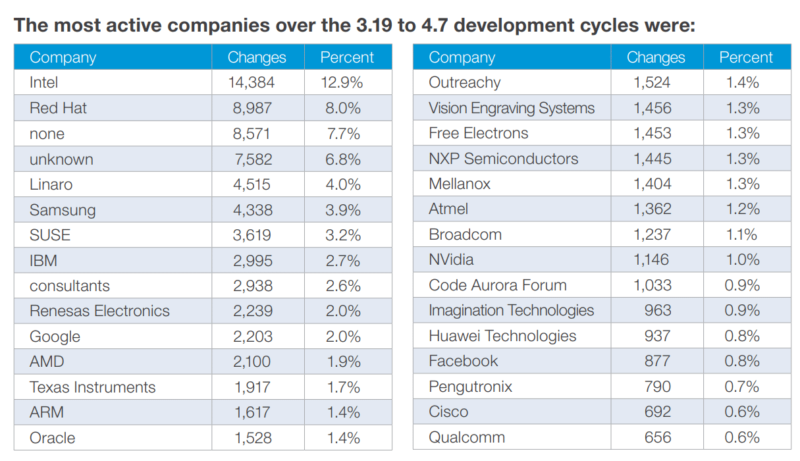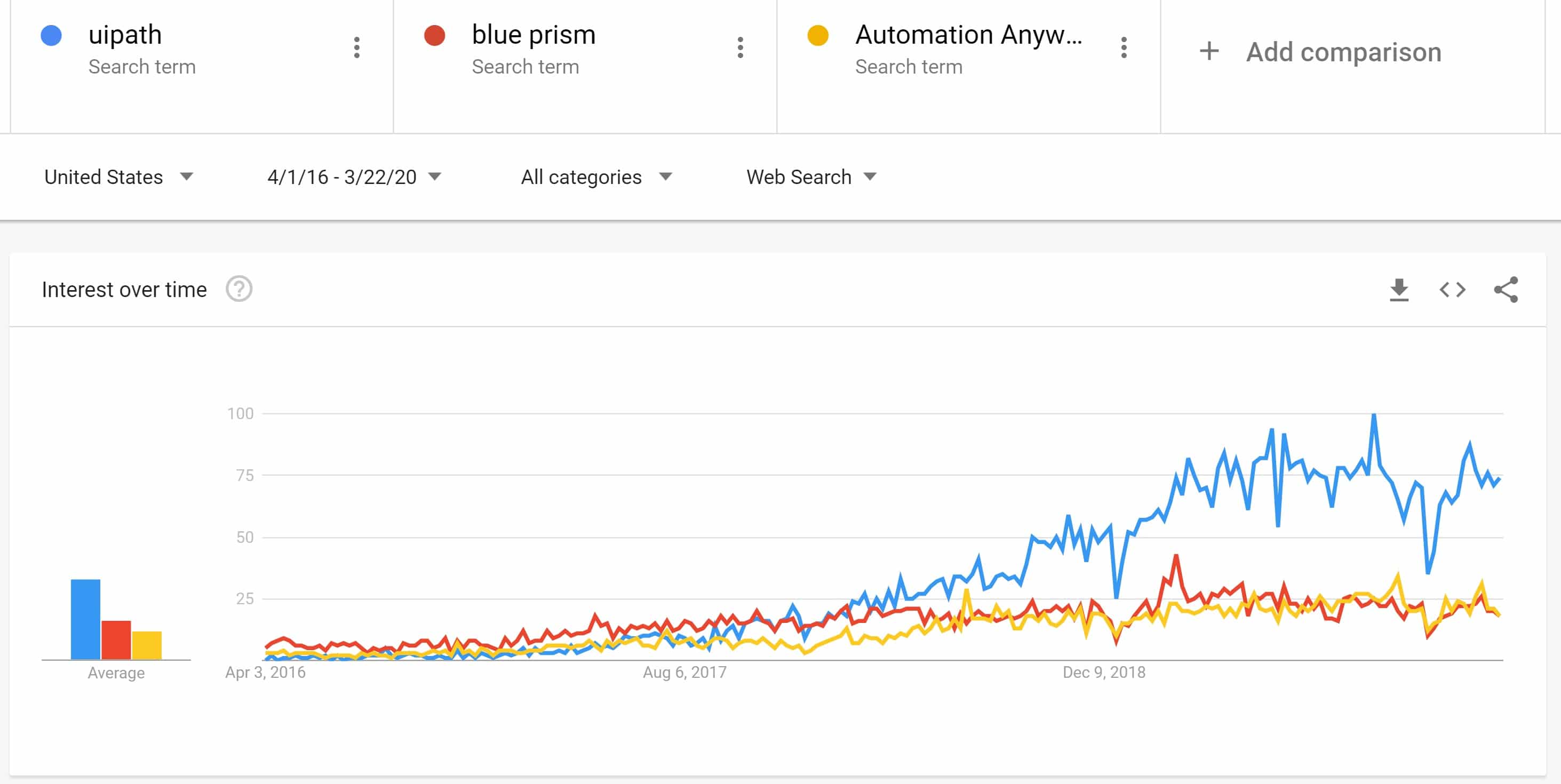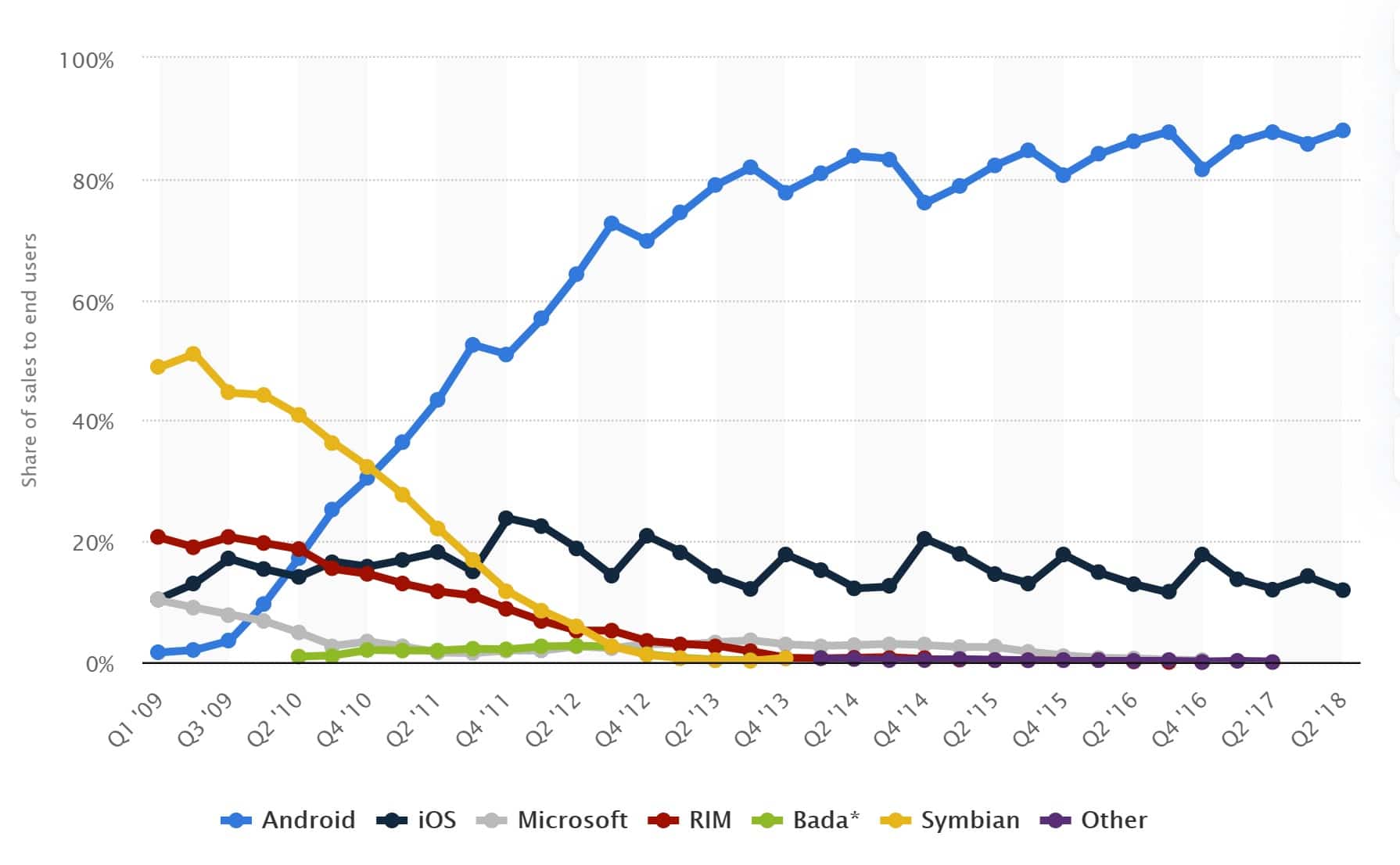
About
As with any software, there are efforts to create open source RPA (in case you have open questions about RPA, check out the most comprehensive article on the topic). Though there’s already some open source RPA providers, open source RPA ecosystem is currently quite immature. We do not expect this to change in the near future because we do not see major for-profit entities supporting open source RPA yet. In all cases of strong open source adoption, for-profit companies heavily supported open source code development. For example, you can see share of contributions to Linux Kernel by for-profit companies in the featured image above.
Learn More
Open Source RPA: Guide with 10 free RPA software of 2020

However, RPA is getting commoditized with numerous player offering similar solutions. And enterprises prefer open source solutions for their transparency and lack of licensing fees. Therefore, open source could play a larger role in the future of RPA.
Though the open source RPA ecosystem is relatively weak now, paid RPA providers are offering either full versions of their software for free trial or limited versions of their software for free:
List of Open Source/Free trial/Community Edition RPA software
This table includes all open source, community edition (i.e. limited) and free trial RPA softwareSEARCH:
| RPA Software (clickable links for download) | Category | Fortune 500 users | Number of contributors on github (as of 22/Mar/2020) | Growth since last observation (10/Aug/2019) | Last commit (as of 22/Mar/2020) |
|---|---|---|---|---|---|
| Argos Labs | 14 day free trial | Softbank, SK Telecom, Toyota and others | |||
| AssistEdge RPA | Freemium | ||||
| Automagica | Open source | ||||
| Automation Anywhere Community Edition | Freemium | Numerous (25 new Fortune 500 customers won in H1/17) | |||
| Robocorp | Open source | ||||
| Robot Framework Foundation | Open source | 104 | 27% | 19/03/2020 | |
| TagUI – AI Singapore | Open source | 11 | 22% | 16/03/2020 | |
| Taskt | Open source | 7 | 75% | 17/03/2020 | |
| UiPath Community Edition | Freemium | Numerous including 8 out of top 10 in Fortune 500 | |||
| VisualCron | 45 day free trial | ||||
| Workfusion RPA Express | Freemium | Numerous |
The list is mostly composed of RPA vendors offering freemium versions of their products. However, Robocorp attracted attention to open source RPA with its 5.6m seed round in 2019.
Open source does not yet have the momentum to shape RPA
When we look at several famous cases of open source success, we see that for-profit corporations leveraged open source software to their advantage. Either the open source project was launched by a for-profit corporation (Android, Chromium) or for-profit corporation(s) embraced the open source software as it allowed them a competitive advantage against competitors (Linux, WordPress). Neither of these are yet the case in RPA.
In the modern software world, all 4 major cases of open source success relied on for-profit corporations:
Successful open source software that benefited from for-profit companies making it part of their offering:
- 1- Linux: Without vendors like Redhat, acquired by IBM in 2018 for 34B, Linux ecosystem would have been much different today. Though Linux was not started by a for-profit company, its growth heavily relied enterprise software vendors. This was a win-win situation. These vendors could access a competent server operating system for free so they could reduce total cost of ownership for their enterprise customers and still make healthy profits offering support services. Linux ecosystem also benefited as these vendors contributed to the software.
- 2- WordPress: WordPress, the content management software powering ~30% of the web, is commercialized by numerous companies. The most prominent company commercializing WordPress is Automattic, founded by the founders of WordPress. Automattic was valued at >1bn in 2014.
Successful open source software started by for-profit companies:
- 3- Android: Google started Android to break Apple’s hegemony over mobile operating systems and protect its mobile advertising business. The fastest way for Android to gain traction was to make it open source and freely available so device manufacturers would have all the incentive to use it. And that’s what Google did and Android became one of the most successful recent open source projects, dominating majority of the mobile OS market.
- 4- Chromium (the code on which Google Chrome is based): Almost the same story for Android but this time Google’s aim was to break Microsoft’s hold on the browser market.
However, we do not see such open source projects embraced by major corporations in the RPA space yet. This could change if RPA implementation companies found an open source solution as strong as the existing closed source solutions. If such a strong open source RPA software existed, they could support it and offer it to their customers. This would reduce total cost of ownership for their customers and therefore increase their addressable market.
Free versions of closed source solutions allow RPA companies to increase their developer base
While we do not currently see open source to lead the way in RPA in the near future, we expect more RPA companies to offer free trial/freemium versions of their software as this allows them:
- Exposure to more developers. Developers are more likely to learn products they can download and play with.
- Exposure to more companies. Freemium versions are especially attractive to smaller companies that want to automate relatively simple tasks. And once they develop their process solutions with freemium RPA, the company providing freemium RPA will be in a good position to upgrade them to a paid package.
A potential example to this is the rise of UiPath. We can not break down every factor that lead to UiPath’s leadership position in the market but they were the first vendor, out of the top 3, to offer a free edition. Dates of the release of free edition for top 3 RPA vendors are: UiPath Community Edition – 2016, Automation Anywhere Community Edition – 2019, Blue Prism Learning Edition – 2019. As seen below, UiPath rose to the top position in terms of its branded Google queries after releasing its community edition in April 2016, when it was the least known of the 3 companies:

Future of RPA is likely to involve more open source
As technologies like operating systems matured, open source adoption increased. For example, the smartphone OS market which got kick started by Apple’s proprietary iOS is now dominated by Android in terms of number of users. A driving factor is that as solutions mature, they become easier to replicate and rely more on outside developers for components. Both customers and component developers don’t want to get locked into a proprietary system and support open source efforts as technologies mature.

We see this trend already happening in RPA as well. Shige Sato, co-founder of Argos Labs, a leading low-code RPA vendor, claims that the RPA industry is already getting commoditized with numerous vendors offering similar capabilities. He explains that is why Argos Labs is focusing on enabling easier integration with open source software such as Python packages as well as closed source machine learning based solutions developed by startups and tech giants. We also believe that future of RPA includes open source and improved integration capabilities.
For more info on RPA, feel free to Learn in Omni Academy
Related Courses – Learn Online Now
Robotic Process Automation (RPA) UiPath
Machine Learning with 9 Practical Applications
Data Sciences with Python Machine Learning
Data Sciences Specialization
Diploma in Big Data Analytics
Mastering Python – Machine Learning
Learn Internet of Things (IoT) Programming
Oracle BI – Create Analyses and Dashboards
Microsoft Power BI with Advance Excel
